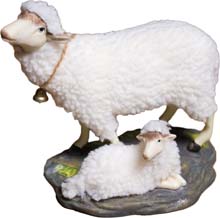 remember quite vividly the warm colorful sights, scents, and sounds of the tropical Christmas seasons of my childhood years.
remember quite vividly the warm colorful sights, scents, and sounds of the tropical Christmas seasons of my childhood years.
Bold, red poinsettias, matched by orange, gold, blue, and green twinkling lights, lent glitter and excitement to the air as the exotic scents of sorrel and cinnamon punctuated the starlit night, as we anticipated culinary delights yet to come. And yet, above the joyous sounds of Christmas carols sung, accompanied by the holiday bustle of boisterous crowds, one crowning anticipation stood out among the rest: the anticipation of the gift.
In my mind I can still see excited little children at the department store, standing patiently in long, winding lines awaiting the wondrous gift, the gift that would signal the true arrival of Christmas.
However, it is not only in the tropics that many await the arrival of the gift. In England, Ireland, Scotland, and Wales little children hang brightly decorated stockings for Father Christmas, the British version of Santa Claus, to fill with treasured presents. Similarly, in France children traditionally place their shoes in front of the fireplace so that Père Noël can fill them with gifts. In Germany Saint Nicholas visits children’s homes on Saint Nicholas’ Eve; and in Spain children celebrate the visit of the Magi to the infant Jesus. Many all over the world pay homage to the power of the gift.
 God Knew
God Knew God the Father, through the prophet Isaiah, also spoke to humanity about the power of a gift, the ultimate gift of His Son, Jesus Christ: “For unto us a child is born, unto us a son is given: and the government shall be upon his shoulder: and his name shall be called Wonderful, Counsellor, The mighty God, The everlasting Father, The Prince of Peace” (Isa. 9:6).*
For many of us believers, though, the critical question becomes, How do we respond to this great gift, the greatest gift of all?
While it is true that different cultures view gift etiquette in different terms, there are undoubtedly certain common features that characterize the acts of gift giving and receiving.
First of all, there is the spirit of caring that engenders the gift. And this spirit of caring can be captured no better than in these magnificent and magnanimous words Jesus spoke to Nicodemus: “For God so loved the world, that he gave his only begotten Son, that whosoever believeth in him should not perish, but have everlasting life” (John 3:16).
The enormous Spirit of generosity embodied in this glorious gift is the same Spirit of generosity that actuates the sun to rise daily in the heavens and to shine brightly in the brilliant morning sky. Indeed, it is the same Spirit of generosity in whom “we live, and move, and have our being” (Acts 17:28).
A similar spirit of generosity can be seen in the response of the Wise Men from the East to the greatest gift the world has ever known: “And when they were come into the house, they saw the young child with Mary his mother, and fell down, and worshipped him: and when they had opened their treasures, they presented unto him gifts; gold, and frankincense, and myrrh” (Matt. 2:11).
For the Wise Men, the presentation of these perfumed and precious gifts was an expression of their gratitude at the culmination of their long quest for the Messiah, the King of the Jews. Once they had miraculously discovered the Christchild through the agency of a star, they could do nothing less than fall down and engage in an act of worship.
Our Response
A second characteristic of gift giving and receiving is the certain feeling of delight on the part of the receiver of the gift. In fact, who among us can claim not to derive great pleasure from the receipt of a gift, especially an unexpected gift of great worth?
What are the implications, then, for how we should respond to the wonderful gift of the Christ? The psalmist counsels us to “delight thyself also in the Lord; and he shall give thee the desires of thine heart” (Ps. 37:4).
As we approach this holiday season filled with its frantic materialism, there is no better time to remind ourselves, as Christians, that true gladness and joy can be found only in our Lord. In this passage we find again a generous God who is committed to giving us not only His onlybegotten Son, but the desires of our hearts as well. What a loving and munificent God we serve!
So in response to His everbountiful gifts, let us delight ourselves in Him. Through the witness of our faith, the transformative power of the gift of Christ, let’s display—this holiday season and throughout the year—the true and exquisite beauty of holiness. Let’s also embody the fruit of the Spirit—love, joy, peace, longsuffering, gentleness, goodness, faith, meekness, temperance (Gal. 5:22, 23)—as the true ornaments of our faith.
Being Thoughtful
Despite our obvious delight and joy in giving and receiving gifts, there is no doubt that in many cultures of the world some particular gifts may be seen as taboo or inappropriate. For example, it is a wellknown tradition in China that it is never a good idea to give knives or scissors, as these may symbolize the breaking of a relationship. When in Italy, avoid the giving of brooches and handkerchiefs, because these items are usually associated with funerals and mourning.
 However, when it comes to our heavenly Father, we never have to worry about receiving gifts that are anything less than perfect. In this regard, the Bible tells us that “every good gift and every perfect gift is from above, and cometh down from the Father of lights, with whom is no variableness, neither shadow of turning” (James 1:17).
However, when it comes to our heavenly Father, we never have to worry about receiving gifts that are anything less than perfect. In this regard, the Bible tells us that “every good gift and every perfect gift is from above, and cometh down from the Father of lights, with whom is no variableness, neither shadow of turning” (James 1:17).
Jesus Himself reminded us, “If ye then, being evil, know how to give good gifts unto your children, how much more shall your Father which is in heaven give good things to them that ask him?” (Matt. 7:11).
So we must come boldly before the throne of grace, making our requests known to our merciful God; we must never be afraid to ask for the spiritual gifts of which we are so desperately in need.
And if, by chance, depression and sadness overtake you this holiday season, don’t be afraid to ask the Savior of the world for joy and optimism. If economic hardships have whittled down your hope for material bounty, ask for God’s blessings of emotional fullness and spiritual hope. Perhaps you are in need of patience as you wait for that anticipated blessing, the special desire of your heart. If so, take your petitions humbly before the Desire of all the ages. In the midst of earth’s turmoil and confusion, the Almighty has promised us good and perfect gifts. Should we not rush to Him to receive these promised presents of peace?
The Fulfillment of a Promise
As I hark back to my childhood days, to the excited little children waiting patiently in long, winding lines for that longawaited gift from Santa Claus, I am flooded with feelings of longing and nostalgia. Yet they were not the first to wait, absorbed with feelings of anticipation for the coming of the gift.
After their fall Adam and Eve waited with eager expectation for the coming Redeemer. Abraham, the father of the faithful, waited with rapt anticipation as he sojourned in a strange land, while being willing to offer up his only-begotten son, the seed of the promise (Heb. 11:17). Isaac, Jacob, Joseph, and Moses, gripped with anticipation, waited for the promised Deliverer. Deborah, Ruth, and Esther each played her role as preserver and progenitor in the lineage of the promised Messiah. Likewise the prophets Isaiah, Ezekiel, and Daniel prophesied and waited enthralled for Christ’s first advent, never losing hope in the ancient prophecies of old.
And so today, as we linger here on earth just a little longer while longing for the second advent of Immanuel, God with us, should we display anything less than rapt anticipation for the second advent of Mary’s Baby, the Child of Bethlehem, the Sun of righteousness, the Light of the world? Surely, He is the Gift worth waiting for, the greatest Gift of all.
So, joy to the world, the Lord is come; let earth receive her King! Even so, come again, Lord Jesus.
_________
*Bible texts in this article are from the King James Version._____________
Heather Joy Knight is provost of Andrews University in Berrien Springs, Michigan.

 remember quite vividly the warm colorful sights, scents, and sounds of the tropical Christmas seasons of my childhood years.
remember quite vividly the warm colorful sights, scents, and sounds of the tropical Christmas seasons of my childhood years.  God Knew
God Knew  However, when it comes to our heavenly Father, we never have to worry about receiving gifts that are anything less than perfect. In this regard, the Bible tells us that “every good gift and every perfect gift is from above, and cometh down from the Father of lights, with whom is no variableness, neither shadow of turning” (James 1:17).
However, when it comes to our heavenly Father, we never have to worry about receiving gifts that are anything less than perfect. In this regard, the Bible tells us that “every good gift and every perfect gift is from above, and cometh down from the Father of lights, with whom is no variableness, neither shadow of turning” (James 1:17).